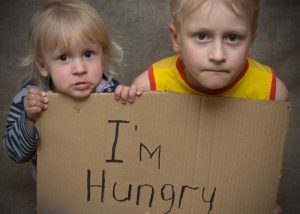MADRID – About 500,000 people called on Caritas in Spain for the first time or after a long time during the Covid-19 pandemic. This is according to a report by Caritas Spain presented on Tuesday.
The report from Caritas Spain shows last year, one in three aid recipients (33%) contacted Caritas for the first time. Those who had not sought help for over a year are included in this group. According to Caritas Spain general secretary Natalia Peiro, in the first months of the pandemic alone, the number of requests for help in Spain increased by 57%. Furthermore, in some periods and regions even tripled.
‘Hunger queues’
People are standing in `hunger queues´, but this is, according to Caritas, “not a new phenomenon caused by the pandemic”. However, the pandemic has given a face to the people who routinely come to different institutions. The difference is that before the pandemic there was no need to queue outside with a 2 metre distance. The needs of families have not reduced, but people can opt for vouchers instead of in-kind help. This way, they do not need to stand in line.
75,000 more households without income
According to a report in February from Caritas Spain, 258,000 people assisted by Caritas live in households with no income. That is 75,000 additional people than before the start of this crisis. Furthermore, over 825,000 people supported by Caritas live in severe poverty (with an income of less than €370 per month for a single household or €776 for households consisting of two adults and two children).
Some 700,000 people live in households that cannot afford the cost of their housing. They cannot heat their homes properly or turn on the lights when needed.
New routes for Caritas
Due to the crisis created by Covid-19, Caritas had to adapt its guidance. The aid organisation is concentrating on maintaining the support to families it was already working with. But in addition assisting families who are coming for the first time, and adapting the work of volunteers and employees.
Massive support
In addition to the efforts of volunteers and staff during the pandemic, the “massive support” received by Caritas was also of great importance, Peira reported. The 70,666 donations represent a value of €65million – €34.5million came from 67,094 private donors and €30.3million from a total of 3,573 companies and institutions. Of the €65million collected, €6.5million were donations in kind.
Of the total funds, €41.1million were allocated to direct aid, enabling a number of families to meet some of their basic needs, such as food, hygiene, housing or other necessities. €991,963 went to health and protection equipment, and €1million was used to recruit additional staff for projects that were out of control.
Children
Children also received support. €3.3million has been allocated to support children to meet their basic needs arising from quarantine. This included computers, internet access or support for distance learning. €2.4million will go to international aid operations.
On the “digital divide”, Peira Spain said that 52% of families in need of aid are in a situation of technical `blackout´. In more than 60% of families, at least one minor had problems finishing the school year, due to lack of constant internet connection.
Loneliness
Another “tragedy” that the pandemic has brought to light, according to Peiro, is the loneliness resulting from the imposed isolation. Caritas now accompanies 11,000 elderly people instead of the 7,000 before the pandemic. It has also created 13 new centres and more than 1,400 new places for the homeless.
Volunteers
With the increasing demand, Caritas saw the number of volunteers decrease by up to 63%. This was due to a large number of the volunteers being older than 65 and therefore belonging to the risk categories. However, over 6,000 new volunteers have since joined Caritas.
Situation will last
The president of Caritas Spain, Manuel Breton, expressed his “gratitude” to the volunteers and staff, the donors, the parishes and society at large, although he warned that “the end is not yet in sight” and demanded that vaccination should be carried out in all parts of the world. Caritas also expressed its feeling of “deep sadness and grief over the loss of human life caused by Covid-19 and is also affected by the “devistating economic and social crisis”. Caritas estimates that poverty and social exclusion will increase as a result of the pandemic.





